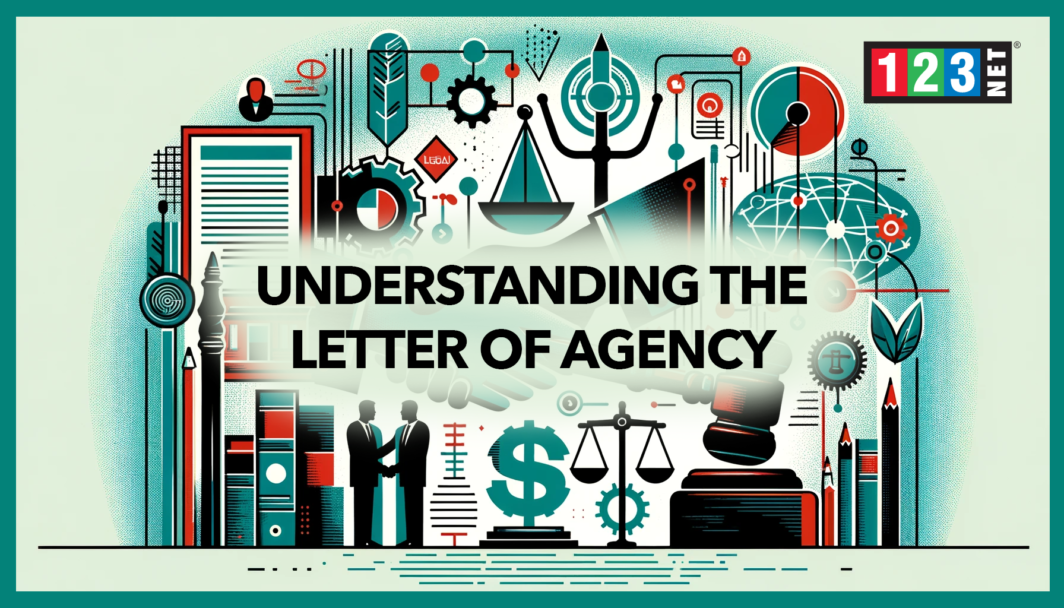
Introduction
A Letter of Agency (LOA) is a formal document that authorizes one party to act on behalf of another in specific legal or business activities. This guide delves into its definition, purpose, and legal significance. Commonly utilized in business, especially telecommunications, LOAs enable actions like contract negotiations and service management by granting authority to agents. This delegation ensures efficient operations by allowing the principal party to focus on broader strategic issues. Proper use of an LOA is crucial to avoid legal complications and optimize business processes, making it an essential tool for corporate management.
Understanding Letter of Agency
Importance of LOAs in Business
An LOA, or Letter of Agency, is far more than a mere formality; it is a vital instrument in the arsenal of business tools. It provides a legal basis for one party to act on behalf of another, typically in specific and well-defined circumstances. Its use is prevalent in industries where operational efficiency is paramount, and where the delegation of authority can significantly enhance productivity.
Utility Management and Service Changes
In the utility sector, LOAs are frequently utilized to delegate authority for crucial tasks such as the setup, management, or alteration of services. This can include everything from electricity and water services to telecommunications and internet provision. By using an LOA, companies can appoint agents who are empowered to handle these tasks, ensuring that services are managed efficiently and without unnecessary delays. This is particularly useful for large organizations that operate across multiple locations, where central management of such tasks would be impractical.
Telecommunications and Contract Management
The telecommunications industry provides a clear example of how LOAs are strategically used to streamline operations. Here, agents are often authorized via LOAs to negotiate and manage contracts on behalf of the client company. This includes a range of responsibilities from negotiating terms and prices to overseeing service modifications and resolving billing disputes.
Such delegation is crucial in telecom where the rapid evolution of technology and service offerings can burden central management with excessive decision-making and administrative responsibilities. Agents handle these tasks, freeing up central management to focus on strategic planning and core business operations.
Streamlining Business Processes
The strategic use of LOAs in delegating authority helps large enterprises manage their workload more effectively. It reduces the strain on central management, mitigates the risk of errors in handling large volumes of operational tasks, and enhances overall business efficiency. By employing LOAs, companies ensure that specialized agents handle complex transactions, which optimizes operations and leads to better service delivery. This tool is indispensable for businesses aiming to maintain agility and competitiveness in fast-paced industries.
Legal Framework
A Letter of Agency (LOA) is not just a practical business tool; it is also heavily regulated by legal frameworks that vary significantly across different jurisdictions. These frameworks are designed to ensure that all parties understand their rights and obligations under the LOA, and that the document itself adheres to stringent legal standards. This is crucial for maintaining the enforceability of the LOA, particularly in situations where legal action might become necessary.
Regulatory Requirements
The core requirement across most jurisdictions is that an LOA must contain clear, unambiguous authorization from the principal party, the entity granting the authority. This involves a detailed delineation of what the agent is permitted to do on behalf of the principal. Legal clarity prevents disputes from arising due to misunderstandings about the scope of authority granted. In addition to clarity, the authorization must be explicit, leaving no room for implied powers beyond those written in the document.
Formal Validity and Enforcement
To be legally binding, an LOA must comply with specific formalities such as signature verification. Signatures must be verified to confirm the identity of the parties involved and to authenticate their agreement to the terms of the LOA. Furthermore, the LOA must clearly define the powers delegated to the agent. This precision is not merely a bureaucratic requirement but a legal necessity that determines the scope of authority granted and helps prevent abuse of power.
The validity of an LOA often hinges on strict adherence to these legal requirements. Should a dispute arise, the document’s ability to withstand legal scrutiny in court depends on how accurately and thoroughly these stipulations have been followed. Courts look for clear evidence that all parties understood and agreed to the terms, and that the necessary legal formalities were observed. This enforceability is essential for any principal relying on an LOA to manage business operations effectively through a designated agent.
How to Draft a Letter of Agency
Drafting a Letter of Agency (LOA) is a meticulous process that demands precision in legal wording and clarity in defining the scope of authorized powers. The document must be crafted carefully to ensure it serves its intended purpose without creating potential legal vulnerabilities.
Clarity and Precision in Authorization
An LOA should explicitly detail the specific tasks that the agent is authorized to perform under its authority. This includes a comprehensive list of duties, from the ability to make decisions to carrying out specific actions on behalf of the principal. It’s crucial to define these tasks as clearly as possible to avoid any ambiguity that might complicate the agent’s ability to perform effectively. Equally important is outlining any limitations to the agent’s powers. These restrictions help to constrain the agent’s authority, ensuring that they do not exceed the mandate granted by the principal.
Avoiding Common Pitfalls
One of the common pitfalls in drafting an LOA is the use of vague terms or granting overly broad authority. Such ambiguities can lead to legal complications, including disputes over what the agent is legitimately empowered to do. Vague language can be misinterpreted, leading to actions that the principal did not intend to authorize. Similarly, overly broad authority might provide the agent with more power than the principal actually wishes to delegate, which could lead to misuse or overreach.
Legal Review and Compliance
To avoid these issues, it is imperative to have every LOA reviewed by legal counsel before it is finalized. Legal experts can ensure that the document complies with local laws and regulations. This can vary significantly from one jurisdiction to another. This review helps safeguard against legal challenges and ensures that the LOA is enforceable under local law. Having a legal professional involved in drafting and reviewing the LOA enhances its legal robustness. Also it provides peace of mind to the principal that their interests are securely protected.
Role of a Letter of Agency in Telecommunications
In the fast-paced telecommunications sector, Letters of Agency (LOAs) are indispensable tools that facilitate efficient and effective operations. They enable agents to represent and act on behalf of clients. ?It is ensuring that critical tasks are handled professionally without needing direct client intervention at every stage.
Facilitating Contract Negotiations and Service Management
LOAs are particularly crucial when it comes to negotiating contracts with service providers. They empower agents to negotiate terms that best meet the client’s needs, from pricing to service deliverables. This capability is essential in telecommunications, where service agreements often involve complex terms that require informed and experienced handling. In addition to contract negotiations, LOAs allow agents to manage service setups. This is ensuring that new services are deployed smoothly and in accordance with the client’s requirements. This can include the coordination of various logistics and technical setups, which are vital for maintaining uninterrupted service and customer satisfaction.
Overseeing Compliance and Technical Upgrades
Another significant role of an LOA in telecommunications is managing regulatory compliance issues. Telecommunications is a heavily regulated industry, and requires dedicated attention that an authorized agent can provide. Moreover, LOAs enable agents to oversee critical technical tasks such as network equipment upgrades or troubleshooting service issues. For example, an LOA might authorize an agent to manage the upgrade of network infrastructure. This is ensuring that the latest technology is integrated seamlessly with minimal disruption to services.
By authorizing specialized agents to handle these tasks, LOAs help telecom companies maintain a competitive edge. As well as adapt to new technologies, and comply with regulatory requirements, all while enhancing service reliability and customer satisfaction.
Business Implications
Leveraging LOAs for Business Efficiency
Businesses across various sectors utilize Letters of Agency (LOAs) to enhance operational efficiency and delegate essential tasks. This is while routine is crucial to their operations. This strategic use of LOAs enables companies to streamline processes. As well as reduce the administrative burdens often associated with managing day-to-day operations.
Streamlining Operations and Reducing Burdens
By delegating authority through LOAs, businesses can allocate resource-intensive tasks such as contract negotiations, client interactions, and compliance management to competent agents. This delegation helps streamline operations by removing the need for senior management to micromanage every aspect of these processes. It allows senior leaders to focus on broader strategic goals while confident that the operational tasks are handled efficiently and effectively. The result is a more agile business able to adapt quickly to changes in the market or regulatory environment.
Navigating the Drawbacks
However, the use of LOAs is not without its challenges. One significant risk is the potential over-reliance on agents. This can lead to scenarios where businesses become too dependent on their delegated representatives. This over-reliance can be problematic if the agent fails to act in the best interest of the company. Additionally, there is the risk of misrepresentation, where agents might act beyond their authority or misinterpret their delegated powers. This is potentially leading to legal and reputational consequences.
Choosing Agents and Defining Powers
To mitigate these risks, it is crucial for businesses to select trustworthy agents and define their authorized powers within the LOA. Establishing clear guidelines and limitations is essential to ensure that the agent’s actions align with the company’s objectives and legal requirements. Regular reviews and audits of the agent’s activities can also help maintain compliance and integrity in the use of LOAs. By taking these precautions, businesses can maximize the benefits of LOAs while minimizing potential drawbacks.
Understanding the Differences Between LOAs and Powers of Attorney
While Letters of Agency (LOAs) and Powers of Attorney (POAs) both authorize one party to act on another’s behalf, significant differences exist in their scope, duration, and legal authority. These differences are crucial for organizations and individuals to understand to ensure the appropriate document is used for their specific needs.
Scope and Duration
An LOA is generally more limited in both scope and duration compared to a POA. Typically, an LOA is tailored for specific tasks within a business context. Such as managing a particular project, handling transactions, or representing the company in specific negotiations. It is usually set for a predefined period that aligns with the completion of these tasks. In contrast, a POA often grants broader powers that can cover a wide range of personal, financial, and legal affairs. It can remain effective for a much longer duration. These are possibly enduring until it is revoked or the grantor becomes incapacitated or passes away.
Legal Powers Granted
LOAs are best utilized for non-critical business functions where detailed. They are specific authority needs to be granted without giving away comprehensive control over more sensitive matters. On the other hand, a POA is more suited for substantial legal dealings. These are often in personal contexts, where a trusted individual is empowered to manage nearly all aspects of the grantor’s affairs. This is from financial decisions to healthcare matters.
This distinction makes LOAs ideal for precise, limited business applications. While POAs are better suited for in-depth, often personal delegations of authority. Understanding these differences helps ensure that the correct legal instrument is employed for the right purpose. They are minimizing risks and clarifying responsibilities.
FAQs
- What legal powers does a letter of agency confer? A: It grants specific powers detailed in the document, generally for business transactions or operational tasks.
- Can a letter of agency be revoked? A: Yes, it can be revoked at any time, provided the revocation process complies with the terms set out in the LOA and local laws.
- How does one verify the authenticity of a letter of agency? A: Verification typically involves checking the signatures against known samples and confirming the authority of the signatory party through corporate records or similar means.
Conclusion
A Letter of Agency is an essential tool in business and legal matters. It is enabling organizations to function efficiently by delegating authority responsibly. It is imperative for entities using LOAs to ensure their proper drafting, execution, and understanding to avoid legal pitfalls and maximize operational efficiency. Whether for routine tasks or specific project needs, an LOA can be a strategic advantage if used correctly.




